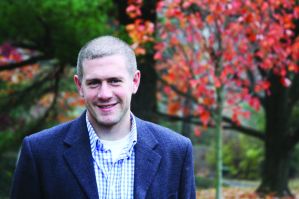 Prompted by a simple question inquiring about his interest, he digs inside of his satchel bag and pulls out notepaper and a pen. Inside a small conference room at Villanova School of Law, second-year student, John Rafferty, draws a graph demonstrating the world’s ignorance to the topic of human trafficking.
Prompted by a simple question inquiring about his interest, he digs inside of his satchel bag and pulls out notepaper and a pen. Inside a small conference room at Villanova School of Law, second-year student, John Rafferty, draws a graph demonstrating the world’s ignorance to the topic of human trafficking.
“If we could take everything we know about human trafficking and put it on a graph,” Rafferty said while drawing a slanted line. “We could say the most we ever really hope to know about human trafficking is maybe 80 percent the scope of the problem. And so there are some people in the world who are fortunate enough to know 80 percent of the world’s knowledge of human trafficking.”
Next, he drew a perpendicular line showing the average of people who knew anything, if at all, about human trafficking.
“A great number of people have no knowledge. Some people have a medium amount of knowledge and by the time we get to the end here, we have almost no one who has 80 percent, or the most amount of knowledge we can hope to have about human trafficking,” Rafferty said.
Rafferty says he realized that he had spent 25 years of his life occupying the large margin of people who knew nothing about this crucial problem.
Rafferty began taking measures in his life to help him learn more about the issue and started to read the U.S. State Departments Trafficking in Persons Report.
As a former Naval Officer, Rafferty was reassigned from San Diego to the country of Bahrain in 2007. With some knowledge of human trafficking, Rafferty researched the trafficking statistics of the place he would be living.
“I found out before moving there that they [Bahrain] were on the tier two watch list,” Rafferty said.
The U.S. State Department ranks every country by how effectively they’re combating trafficking. Tier three would be the most severe case of trafficking and the smallest amount of law enforcement monitoring the issue.
While in Bahrain, Rafferty contacted the U.S. Embassy and informed them of the severity of human trafficking in the country.
“Their response was ‘we’re really overwhelmed and overworked and we don’t have time so we’re really not doing anything,’” Rafferty said.
With the discouraging news, Rafferty contacted an Arab Non-Profit Organization working to monitor the trafficking. He met with the executive director of the NGO and immediately began volunteering his time.
“On weekends I spent a lot of time fundraising by interviewing men at labor camps, taking photographs and publishing newsletters,” Rafferty said. “I wanted to understand more about trafficking and get close to the victims to learn their stories. And I realized that’s done by learning about those who migrate to a new country and seeing the various levels of exploitation.”
Rafferty explained that his overseas experience ignited his interest and devotion to end human trafficking.
“Seeing first hand the conditions and the lack of pay these people are subjected to, really incensed me about this problem and convinced me that I want to spend the rest of my life working to combat this horrendous crime,” Rafferty said.
After his assignment was complete in Bahrain, Rafferty knew he wanted to work closely with his own country’s efforts to monitor this crime.
This summer Rafferty interned at the Polaris Project, an NGO founded eight years ago by two college students who believe a world without slavery is achievable in our lifetime. Rafferty worked as a senior policy and legal specialist.
There, Rafferty worked full time to learn the ins and outs of modern day slavery.
Today Rafferty studies full time at Villanova and continues to heavily research the government agency’s efforts to focus on human trafficking. He stands by the notion that standing for something alone is more powerful than not standing for anything at all.
“We live in a society that gets what it wants when it wants it. And for us to start taking a stand and say that we aren’t going to stand for this… Only a few people would be willing to stand alone,” Rafferty said.


